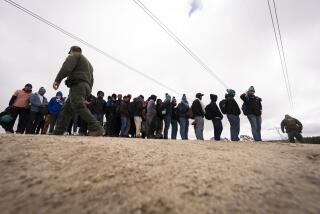Editorial: Why asylum matters

World War II lasted six years and caused the deaths of about 60 million people, three-quarters of them civilians. It involved some 40 nations — significantly more than half of the countries in existence at the time — and laid waste to vast swaths of Europe, Asia, North Africa and islands scattered across the western Pacific. By the time the war ended, an additional 60 million people had been forced from their homes and often their countries, creating a massive humanitarian crisis and raising thorny issues over who has the right to live where, and what responsibilities governments have amid so much chaos and confusion.
The world slowly sorted it out. In 1951, the United Nations drafted its Convention Relating to the Status of Refugees, the first in a series of post-war international agreements that established the fundamental rights of people to seek asylum in other nations if they have a well-founded fear they will be persecuted “on account of race, religion, nationality, membership in a particular social group, or political opinion,” as the U.S. Refugee Act of 1980 phrased it. That right to seek asylum arises from a fundamental recognition that, as the Founding Fathers asserted in the Declaration of Independence, “all men are created equal, that they are endowed by their Creator with certain unalienable Rights, that among these are Life, Liberty and the Pursuit of Happiness.”
We’re in similar straits today. There are more people displaced now by war and instability, primarily in the Middle East and Africa, than any time since the end of World War II. Granted, the global population is about three times what it was in 1950. War, though, is the primary driver in both crises, leaving millions of people from Syria, Afghanistan, South Sudan, Myanmar and elsewhere squatting in resettlement camps or scattered among foreign populations.
There are more people displaced now by war and instability, primarily in the Middle East and Africa, than any time since the end of World War II.
Of course, enshrining the right to seek sanctuary into law and letting people exercise that right are separate things, and the world has a mixed record on the latter. For instance, the Trump administration decided to accept less than half of the refugees the Obama administration agreed to in its last year. And its “zero tolerance” policy of filing misdemeanor criminal charges against desperate (mostly) Central Americans crossing the U.S.-Mexico border to seek asylum seems to directly violate international agreements. The policy of separating children from their parents to try to deter asylum-seekers was grotesquely cynical and inhumane, and denying them due process, as Trump has proposed, is an abomination.
It’s true that not everyone arrested at the southern border is seeking asylum. But many asylum-seekers’ claims are being rejected under a blinkered reading of U.S. law that doesn’t acknowledge how gang violence, corruption and state-sanctioned domestic abuse can drive people from their homelands just as effectively as missiles and pogroms. Worse, the Justice Department reportedly is preparing a new plan to deny asylum to anyone prosecuted for entering the country illegally, despite international agreements that call for asylum requests to be honored wherever refugees present themselves.
Europe has similar problems living up to the spirit of asylum. The human tide flowing from the Middle East and North Africa has strained resources and governments, becoming a point of friction within the European Union. It could bring down Angela Merkel’s governing coalition in Germany, though a migration deal struck late this week might ratchet down the political pressure.
Enter the Fray: First takes on the news of the minute from L.A. Times Opinion »
Yet there’s a difference between migrants fleeing temporary upheaval and those who seek asylum intending to begin new lives in new lands. Most migrants eventually hope to return home. But many will not be able to. Since 1975, the U.S has resettled 3.3 million refugees, more than any other nation, led by 380,000 from the former Soviet Union and Russia and 182,000 from Vietnam. That reflects well on the nation, but much more needs to be done.
All nations have a right to determine who gets to resettle within their borders, who gets to become a citizen and how many can reasonably be accommodated. The Trump administration is trying to narrow the numbers of people allowed to immigrate, and who may do so; after decades of policies centering on family reunification, Trump wants to shift to a merit-based system. That’s a discussion worth having.
But the administration’s reduction in refugee resettlements and directives to immigration officials to draw a harder line on who qualifies for asylum undermine the nation’s reputation for taking in “your tired, your poor, your huddled masses yearning to breathe free” and runs counter to one of the modern world’s best inclinations: to offer sanctuary to fellow human beings who find themselves buffeted by the winds of war or persecution. We don’t have to have open borders, but we must keep an open heart.
Follow the Opinion section on Twitter @latimesopinion or Facebook
More to Read
A cure for the common opinion
Get thought-provoking perspectives with our weekly newsletter.
You may occasionally receive promotional content from the Los Angeles Times.










